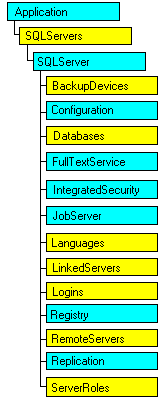SQL-DMO

SQLServer Object
The SQLServer object exposes the attributes of an instance of Microsoft® SQL Server™.

Properties
Methods
Events
| CommandSent Event | RemoteLoginFailed Event |
| ConnectionBroken Event | ServerMessage Event |
| QueryTimeout Event |
Remarks
The SQLServer object contains the objects and collections that implement SQL Server administrative tasks for SQL-DMO. The object allows SQL-DMO applications to connect to an instance of SQL Server by name, establishing the context for administrative tasks.
With the SQLServer object, you can:
- Connect to an instance of SQL Server.
- Query an instance of SQL Server to determine its installed configuration and run-time parameters.
- Add and remove SQL Server objects, such as backup devices, databases, and logins.
- Execute Transact-SQL or operating system commands on the server.
- Disable processes on an instance of SQL Server.
- Trap SQL Server events and SQLServer object events, providing status information to SQL-DMO application users or debugging information to SQL-DMO application developers.
Note The SQLServer object is compatible with instances of SQL Server 2000 and SQL Server version 7.0. However, the SQLServer2 object extends the functionality of the SQLServer object for use with features that are new in SQL Server 2000.